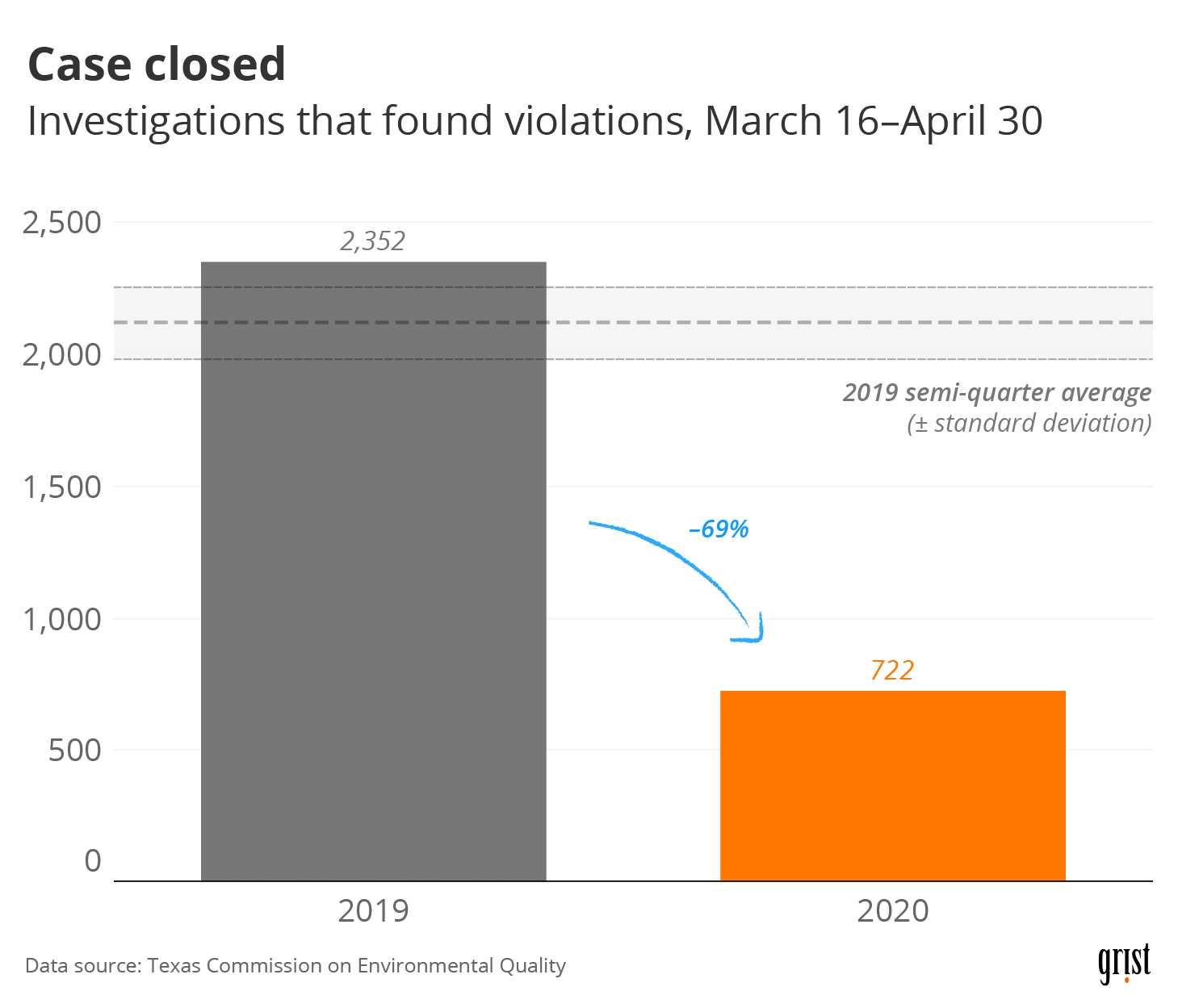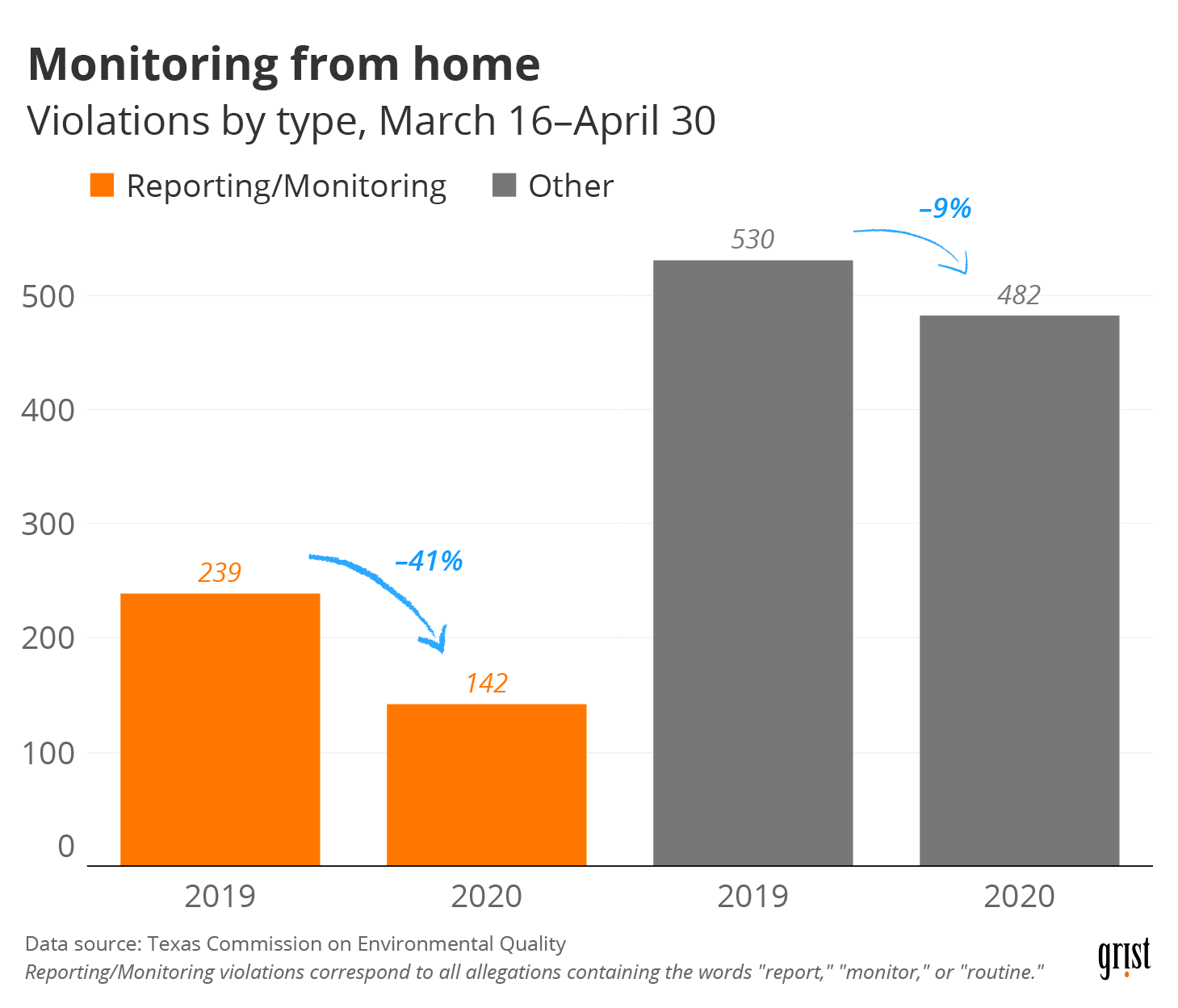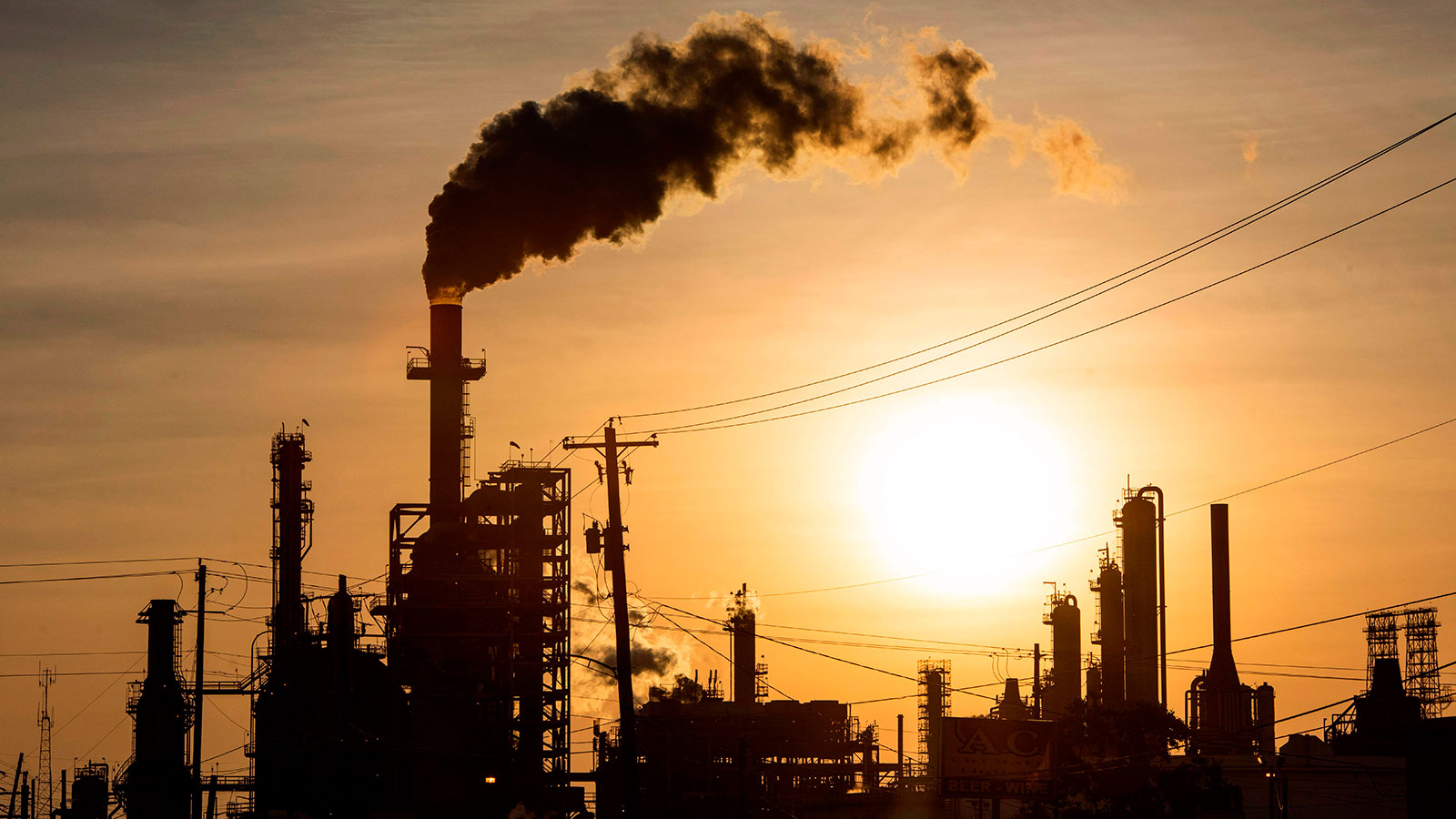The Texas Commission on Environmental Quality (TCEQ) is one of the largest and most influential environmental protection agencies in the country. With an annual budget of $400 million, it polices about 400,000 polluting businesses and conducts more than 100,000 inspections in a normal year. The agency inspects not only the state’s many large refineries and chemical plants, but also its neighborhood gas stations, dry cleaners, and public water systems.
Many of the state’s 29 million residents live in the shadow of heavy industry and in cities with smog levels that rank among the worst in the country. In short, a slowdown in TCEQ’s enforcement efforts could be deadly. So when the COVID-19 pandemic brought the country to a halt earlier this year, TCEQ’s chairman penned an open letter reassuring environmental advocates that, even though employees were going to work from home, the agency would continue to be “fully engaged in its mission to protect public health and the environment.”
But a Grist analysis of the agency’s internal data has found that, in the six weeks after the agency asked employees to work from home in response to the pandemic, TCEQ pursued 20 percent fewer violations of environmental laws than it did during the same period in 2019. The agency also initiated 40 percent fewer formal enforcement actions resulting in fines for polluters. Finally, in a move that appears in line with the Environmental Protection Agency’s controversial discretionary enforcement policy, TCEQ issued about 40 percent fewer violations to companies for failing to monitor and report pollutants emitted into the air and water.
Even as the agency reduced enforcement, it continued processing permits that allow construction companies, industrial facilities, and other businesses to pollute up to certain limits at about the same rate that it did last year.
Adrian Shelley, director of the consumer advocacy group Public Citizen’s Texas office, called TCEQ’s enforcement slowdown “disappointing” and said that Grist’s investigation shows that the agency prioritizes permitting over compliance.
“There’s been a large period of very little regulatory oversight,” he said. “The implications for community health and for the workers at the facilities really concern us.”
In a 7-page response to Grist’s findings, TCEQ spokesperson Brian McGovern denied that the agency had scaled back its oversight of polluting businesses during the pandemic, listing various shortcomings of the data his own agency provided. He said that TCEQ conducted a separate analysis of its enforcement work and found that inspections had decreased by just 10 percent.
“While there have been some decreases in these [enforcement] activities as staff transitioned to working remotely and the economy has slowed suddenly and dramatically, these decreases are far more modest than you have concluded,” McGovern said.
The agency has long been criticized for lax enforcement. Analyses of TCEQ’s enforcement work by environmental advocates and journalists have consistently found that the agency rarely penalizes polluters while disproportionately issuing fines against small business owners. A 2017 Texas Tribune investigation found that the agency levied fines in fewer than 1 percent of the cases in which polluters exceeded air emission limits.
“Any further relaxation of environmental protections will keep endangering Texans who are facing this triple threat of air pollution, chemical disasters, and now COVID-19,” said Catherine Fraser, an associate working on air quality issues at the nonprofit Environment Texas.
Shifting priorities
TCEQ inspectors — both full-time employees and contractors — perform more than 100,000 inspections a year. Just 5,000 of them are in response to complaints; many of the rest are routine and dictated by federal laws. (For instance, every gas station in the state is inspected once every three years due to a mandate in the 2005 Energy Policy Act.) About two-thirds of the inspections are conducted on-site while the remainder are performed remotely by reviewing self-reported data from businesses.
Once an inspection is complete, inspectors write up any violations of environmental rules they may have witnessed. These citations range from relatively minor paperwork violations to more serious infractions, like those that cause degraded air and water quality. If a polluter does not correct the issue that led to a notice of violation — or if the agency decides the violations are exceedingly serious — then TCEQ purses formal enforcement action, which is typically accompanied by fines and an order to remediate the issue.
In order to assess TCEQ’s decision-making during the pandemic, Grist requested data about the complaints the agency received, the inspections it conducted, and violations and enforcement action it pursued from the beginning of 2019 through the end of May. Due to lag times in updates to the agency’s internal database, we limited our analysis to the six-week period starting March 16, when TCEQ employees began working from home.
We found that, across the board, the agency’s enforcement work shifted after Governor Greg Abbott directed state agencies to provide remote work options to employees in March. For one, the agency conducted far fewer inspections that led to violations. Last year, the agency conducted about 2,120 such inspections every six weeks, on average. But between March 16 and the end of April this year, that number dropped to about 722 — a nearly 70 percent decrease.

Clayton Aldern / Grist
TCEQ also issued 20 percent fewer violations in March and April, compared to the same six-week period last year, and likewise found fewer more serious violations of environmental laws. Agency staff categorize violations as “major,” “moderate,” and “minor” when calculating penalties depending on the amount of pollution, the threat to public health and the environment, and the compliance history of the business in question. Major violations are the most severe and trigger mandatory enforcement action resulting in fines, while minor violations are often over paperwork. While the types of violations fluctuate dramatically over the course of a given year, Grist’s analysis found a marked decrease in “major” and “moderate” violations after the shutdown compared to last year. From mid-March through the end of April last year, the agency issued citations for 17 “major” violations, but during the same time period this year, the agency found just three. “Moderate” violations were also down by about 20 percent.
“That’s a large shift,” said Tim Doty, a former TCEQ employee who worked in the agency’s enforcement division before retiring in 2018. “Is it because companies are coming up with excuses or a natural explanation? Maybe [inspectors] can’t get an in-person look and they’re not inclined to assign [the violation] a ‘major’.”
The agency also appears to have changed how it handles violations of routine monitoring and record-keeping requests. In March, it announced that businesses that are unable to comply with environmental rules due to the pandemic may request enforcement discretion from the agency. According to a spreadsheet that the agency has been updating on its website, it has received about 150 requests for enforcement discretion and granted about 80 percent of them. The vast majority of these requests are for extensions to reporting and monitoring deadlines.
The agency’s decision to overlook these monitoring and reporting violations may partially explain the overall decrease in violations. In March and April of 2019, the agency issued about 240 record-keeping and routine monitoring violations. This year it issued about 142 of those violations — a 40 percent decrease. Similarly, notices of enforcement — formal notification to businesses that the agency intends to seek penalties for violations — were also down 40 percent.
The decrease in enforcement activity is likely not due to businesses closing down to comply with stay-at-home orders. The vast majority of facilities that TCEQ oversees — gas stations, public water systems, and oil and gas infrastructure — were considered essential and exempted from shutdown orders.

Clayton Aldern / Grist
“This is really very bad in my view, because the plants are getting away with breaking the law now,” said Neil Carman, a former TCEQ air inspector who now works for the Sierra Club in Austin. “They’re probably less worried because they don’t think anybody’s going to come out there and call them about their violations.”
McGovern, the TCEQ spokesperson, said that the “conclusion that TCEQ is choosing to pursue less severe violations is incorrect” and that the agency “does not choose which violations it finds or pursues based on severity.” He said that TCEQ does not have a policy to not pursue violations of monitoring and reporting requirements during the pandemic and that the number and severity of violations can vary from year to year for other reasons — “sometimes dramatically” and “without our knowing or ascribing a reason.”
McGovern’s main criticism of Grist’s analysis pointed to several flaws in the data that the agency itself provided, which he said did not lend itself to an “apples-to-apples comparison between 2019 and 2020.” For one, the agency provided Grist with data on investigations that led to violations — not the entire universe of investigations. (While this might impact the accuracy of the raw numbers Grist analyzed, it would not impact the accuracy of the year-to-year changes.) McGovern also said that lag times for database updates could cause an undercount of inspections for 2020.
TCEQ publishes monthly enforcement reports outlining the number of inspections conducted and enforcement actions pursued. In response to Grist’s findings, TCEQ conducted its own analysis and found that it was conducting just 10 percent fewer inspections over the ten-week period from mid-March to the end of May, compared to last year. The discrepancy in findings is likely a result of the limitations McGovern listed as well as the agency’s method of counting inspections: According to McGovern, a single investigation report can contain multiple “investigation activities.” A count of these investigation activities is reported publicly and to the state legislature.
But Grist’s findings are also reflected in data that the agency is required to submit to the Environmental Protection Agency (EPA). Under the Clean Air Act, the EPA has delegated much of its permitting and enforcement authority to states. Chemical plants, steel mills, refineries, and other air polluters receive permits from TCEQ so they can emit pollutants. Then, TCEQ reports the number of inspections and fines issued to those facilities. That data show that the agency conducted about 180 inspections each month in 2019. But the inspection numbers plummeted to 88 in March 2020 before climbing back up to 156 in April and 133 in May.
“This is just further evidence that the agency is giving polluters a free pass to pollute during a pandemic, when we should really be doing everything that we can to protect our health and our environment,” said Fraser, the advocate with Environment Texas.
A downward trend
A further look back at TCEQ’s oversight of large polluting facilities also shows a downward trend in inspections over the past 10 years. At the beginning of the decade, the agency was conducting more than 7,500 inspections per year of federally-permitted facilities with limits on air emissions. Those figures have now dwindled to a little over 2,000 — despite the number of facilities the agency is overseeing remaining steady. Similarly, penalties, violations cited, and formal enforcement actions taken against these facilities have also declined significantly.
After the EPA announced its temporary relaxation of monitoring and reporting rules for polluters in March, many states and environmental groups sued. In a recent filing, they argued that the agency did not consider the effects of the policy on public health and safety — particularly on low-income communities of color that disproportionately live close to polluting facilities.
“In addition to this existing backdrop of public health concerns, mounting evidence regarding the incidence of COVID-19 in low-income and minority communities amplifies the importance of considering the Policy’s impact on public health,” the attorneys representing nine states wrote.
In Texas, too, the effects of scaling back enforcement are likely to be felt disproportionately by communities of color. An analysis by the University of Texas Health Center found that neighborhoods close to industrial facilities in Harris County — where Houston is located — are at higher risk for hospitalization and intensive care needs due to COVID-19. These neighborhoods are also already at higher risk for cancer and a slate of respiratory illnesses.
Environmental and public health advocates say that lax enforcement and poor regulatory oversight are to blame for the distressingly frequent industrial fires and explosions in the Houston area. Last year alone, two major fires at petrochemical sites near the Houston Ship Channel burned for days and blanketed the city in a plume of thick smoke. A 2016 Houston Chronicle investigation found that major chemical accidents occur in the Houston area every six weeks — and that industry being allowed to self-regulate is one major reason for the frequency of unsafe incidents.
“The lack of enforcement action taken by TCEQ is creating this culture where safety and health laws aren’t prioritized,” Fraser said. “There’s often little incentive to comply with the law.”
Clayton Aldern contributed data reporting to this story.




